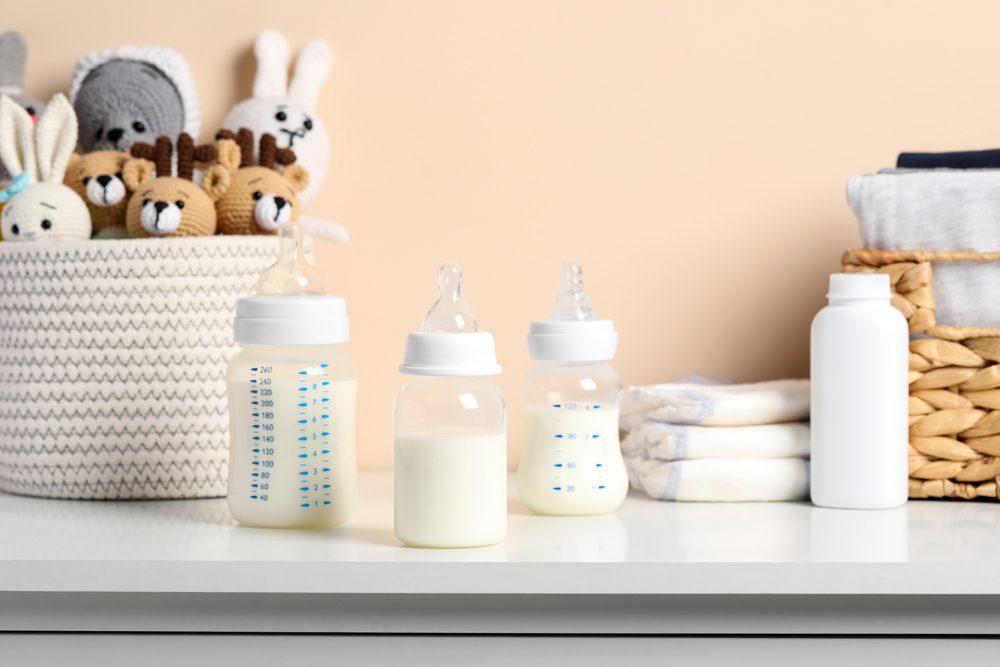Bringing your newborn baby home from the hospital is an exciting and nerve-wracking moment for many new mothers. Your life is changing for the better, and now you have a baby to take care of. Breastfeeding your baby is a magical bonding moment, but how do you know when it’s the right time to start weaning?
If you have questions about when to stop breastfeeding or how long to breastfeed, you’ve come to the right place. This guide will cover the basics of breastfeeding and how to know it’s time to start weaning your baby.
Table of Contents:
- How Long Should You Breastfeed?
- How Often Should You Breastfeed?
- So When Do You Stop Breastfeeding and Start Weaning?
- Helpful Methods to Stop Breastfeeding
- What to Expect When You Stop Breastfeeding
- Breastfeeding FAQs
How Long Should You Breastfeed?
According to the American Academy of Pediatrics (AAP), your baby should only be fed breast milk for the first 6 months. After 6 months, it’s up to the mother and baby on how long to continue breastfeeding.
You can safely breastfeed your baby until they’re 2 years old, but you don’t have to if you don’t want to. You can choose to start weaning your baby whenever you feel is best after those initial 6 months.
When supplementing breast milk with solid foods, pick ones that are high in iron, zinc, and protein. These nutrients are especially important for your baby’s development.
Can You Stop Breastfeeding Early?
Your baby needs exclusively breast milk for the first 6 months. After that, it’s up to the parents to decide when they want to stop breastfeeding. There are many reasons to stop breastfeeding early, including insufficient milk supply, medical reasons, a difficult or painful latch, returning to work, or personal reasons such as mental health.
Many mothers continue breastfeeding for the first 2 years, supplementing food when needed. Babies less than a year old should be supplemented with infant formula. After a year, you can start introducing solid foods along with intermittent breastfeeding.

How Often Should You Breastfeed?
The daily schedule for breastfeeding your baby depends on your baby’s age. As your baby gets older, they will require fewer feedings. If you’re breastfeeding your baby on demand, learn your baby’s hunger cues to know when it’s time to feed them.
- Newborns: Newborn babies typically eat every 1 to 3 hours. Breastfed babies may eat more frequently than babies eating formula, as breastmilk is digested quicker than baby formula.
- 1 to 3 Months: Babies at this stage can expect to eat every 2 to 4 hours. If you’re trying to keep your milk supply up, keep in mind that your body will produce more milk the more frequently you feed your baby or pump.
- 4 to 6 Months: At this stage, babies are more easily distracted, and it may be difficult to get a full feeding in. You can try moving to a quiet place to breastfeed, or you can do smaller, more frequent feedings.
- 6+ Months: This is the stage where solid foods are introduced. Your baby’s breastfeeding habits will change, and they may become more interested in solid foods. You can supplement with breastfeeding based on what your baby wants or needs.
- 12+ Months: This stage of breastfeeding can vary. Your baby may want to continue breastfeeding, or they may start weaning themselves.
Read More: 12 Important Facts About Breastfeeding
So When Should You Stop Breastfeeding and Start Weaning?
Weaning is the process of breastfeeding your baby less frequently until they no longer need to latch. You can wean your baby off your breast and transition them to a bottle, or you can start introducing solid foods.
There are a handful of reasons you may want to start weaning your baby. These include:
- A Preference for Bottle Feeding
- Returning to Work
- Low Milk Production
- Medications
- Personal Choice

Helpful Methods to Stop Breastfeeding
Weaning your baby is a personal preference that varies from family to family. There’s no right or wrong answer, as long as your baby is fed and happy. If you’re not sure when to start weaning your baby, here are some methods you can try. See what works best for your family, whether that be baby-led or parent-led weaning.
Baby-Led Weaning:
Baby-led weaning means you follow your baby’s cues. As they get older, they may become more interested in solid foods. Nurture that curiosity by offering them a wide variety of age-appropriate solid foods while keeping your normal breastfeeding schedule.
Over time, you’ll notice your baby is more interested in solid foods than breastfeeding. You can lessen the number of feedings if you notice your baby is latching less, while still offering it to them for nutrients and comfort. Eventually, your baby will take themselves fully off breastfeeding and onto solid foods.
Parent-Led Weaning
For parent-led weaning, you start to lessen the number of feedings on your own. This can include breastfeeding for shorter periods or cutting out a feeding from your schedule. Make sure this process is gradual and your baby is still getting adequate nutrition.
Tips for Weaning:
- Before 6 Months: Babies less than 6 months old need to be supplemented with formula or breastmilk from a bottle. Do not introduce solid foods before 6 months.
- After 6 Months: After introducing solid foods, you may want to start decreasing the number of daily breastfeedings. You can transition your baby to a bottle with breast milk or formula if you want to wean them off the breast.
- After 12 Months: At this point, your baby should be on a variety of solid foods. Breast milk still provides important nutrients and antibodies, but you can either transition your baby to a breast milk bottle or a milk of your choice. They don’t need formula at this stage.
What to Expect When You Stop Breastfeeding
Post-partum is a time full of changes, and these changes can be emotionally and physically draining. When you stop breastfeeding, you can expect physical, emotional, and bonding changes with both you and your baby.
- Physical Changes: Weaning leads to hormonal fluctuations that change your body. You may notice smaller breasts and weight fluctuations. These are healthy and normal changes.
- Emotional Changes: Babies nurse for nutrients and emotional comfort. Weaning off of breastfeeding is a difficult change for them, and you may notice your baby is more fussy or upset. Guilt is also a normal feeling for new mothers weaning their babies, but use this opportunity to explore new things with your baby and find the joys. You’re still a great mother.
- Bonding Changes: Breastfeeding is an important bonding experience for mother and baby. As you’re weaning, find other ways to bond with your baby, such as snuggling or having more playtime.

Breastfeeding FAQs
What is weaning?
Weaning is when you gradually stop breastfeeding your baby and supplement nutrients with other forms of milk or solid food. Whether you supplement with milk alternatives or solid food depends on your baby’s age and developmental stage. The less you breastfeed your baby, the less milk your body will produce, and your supply will begin to dry up. Depending on your family’s needs, you can either do baby-led or parent-led weaning.
Should you pump while weaning?
While weaning your baby, you may start to notice that your breasts are engorged with milk and uncomfortable. You can pump or hand-express enough milk to ease the discomfort but do not pump until there’s no more milk. This sends signals to your body that it needs to produce more to feed your baby, and your supply will not dry out as it should.
If weaning leaves you with painful and tender breasts, you can relieve the discomfort with ice packs or over-the-counter pain medicines.
Do you lose weight when you stop breastfeeding?
Weight fluctuations after breastfeeding vary from mother to mother. Your body is burning an extra 500 calories a day producing milk to feed your baby, and weaning causes a drastic shift in caloric needs. Some mothers lose weight when they stop breastfeeding while others gain weight, but both are normal and healthy.
Another factor is your hormones. When you stop breastfeeding, your body stops producing the hormone “prolactin” which promotes milk production. Your estrogen levels increase at the same time. These hormone fluctuations can also lead to weight gain or loss—both of which are perfectly normal after weaning your baby.
Contact Women’s Health Arizona Today
Motherhood is an exciting new beginning filled with anticipation and new experiences. Not only does your body create a new life for 9 months, but then it’s capable of providing food and nourishment for that new life through breast milk.
Breastfeeding your baby is a bonding experience that brings you closer to your baby, and it can be tough to tell when it’s time to start weaning. Do what works best for you and your baby, and work with a lactation specialist if you have any concerns.
Looking for professional help with breastfeeding and weaning? Our physicians at Women’s Health Arizona offer lactation support in the Greater Phoenix and Prescott area.
Contact us today to schedule an appointment with one of our lactation consultants, and we’ll be happy to help you navigate breastfeeding and weaning.

